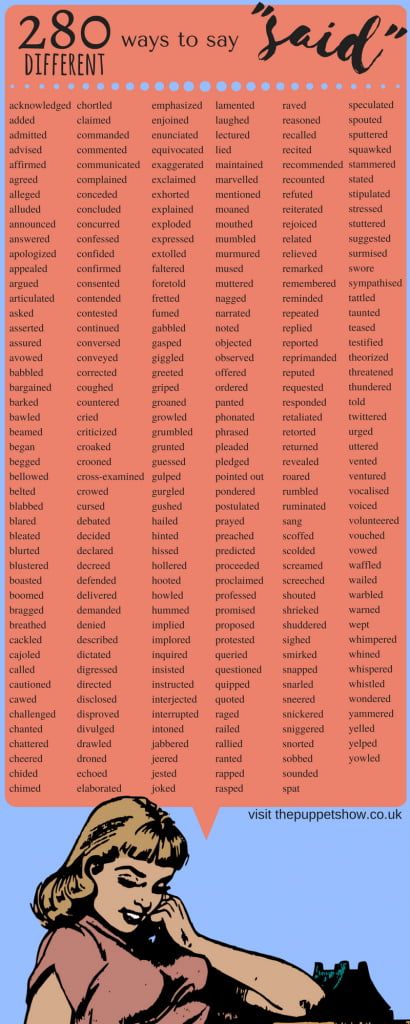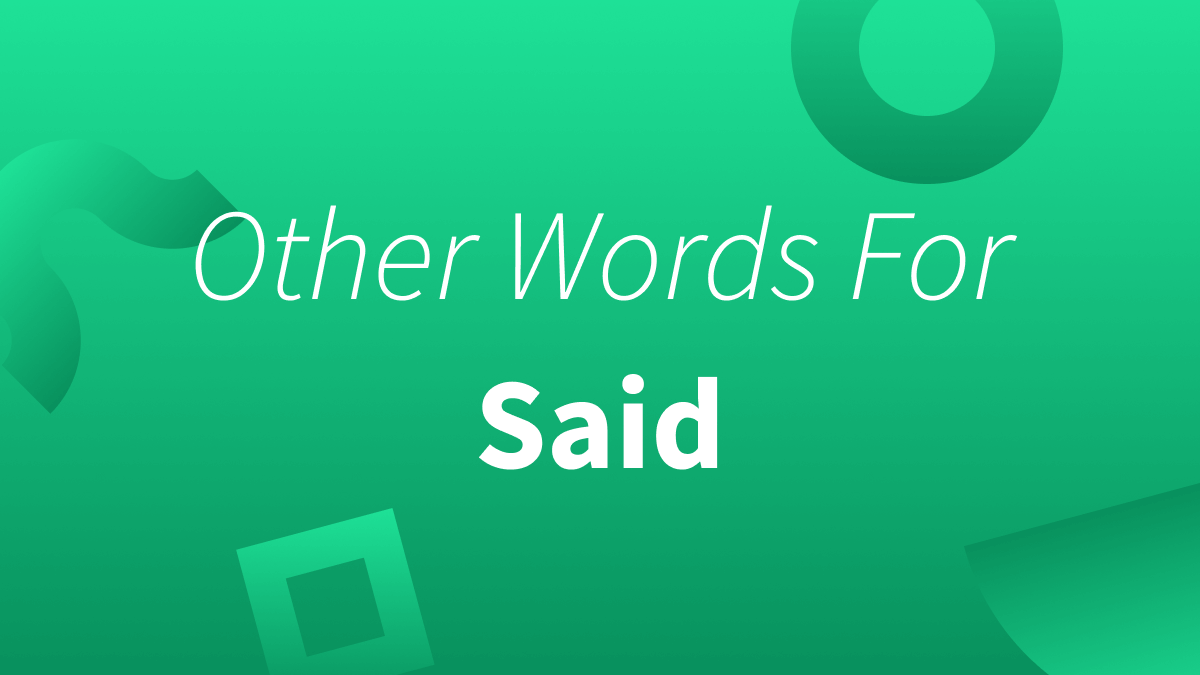10 “Said” Synonyms You Can Use in All Types of Writing
powered by
LanguageTool
Elevate your writing by adding these ten synonyms of “said” to your vocabulary. They can be more accurate and help you avoid repetitiveness throughout your text.
Other Words You Could Use Instead of “Said”
- Knowing other words you can use in place of said can improve your writing because it adds variety and removes repetitiveness.
- Five formal alternatives of said are: announced, commente, explained, replied, and stated.
- Five creative alternatives of said are: whispered/exclaimed, rambled, chimed, bemoaned, and scolded.
Why You Should Know Other Ways To Say “Said”
Whether you’re writing a formal text or creative text, you may notice that said is a frequently used verb. After all, it denotes information that someone has spoken. Said can be found in essays such as explanatory essays, where the writer has to explain what a source has, well, said.
It’s also found in creative writing to commence a dialogue. Below, you’ll find five alternatives that are perfect for formal settings and five alternatives that are great for creative writing.
Five Other Ways To Say “Said” In Formal Writing
1. Announced
As you might have guessed, this alternative is perfect when you are quoting an announcement.
On Thursday, the Coca-Cola Company said they would be changing the color of their Sprite bottles to allow for easier recycling.
↓
On Thursday, the Coca-Cola Company announced they would be changing the color of their Sprite bottles to allow for easier recycling.
Use this said alternative when you are quoting someone’s opinion or response to something.
“It was long overdue,” the principal said after the school was finally remodeled.
↓
“It was long overdue,” the principal commented after the school was finally remodeled.
3. Explained
Use explained when referring to an explanation someone gave.
The lead scientist said that the results were not at all unusual.
↓
The lead scientist explained that the results were not at all unusual.
4. Replied
Replied is used when someone is answering a question or replying to something.
“The animals are all fine,” said the shelter director when asked about the incident.
↓
“The animals are all fine,” replied the shelter director when asked about the incident.
5. Stated
Stated is used exactly as said, but carries a more formal tone.
She said that all airline issues should be resolved in a few months.
↓
She stated that all airline issues should be resolved in a few months.
Five Other Ways To Say “Said” in Creative Writing
These other words for said are perfect within dialogue, to advance a storyline, or for many other creative uses.
1. Whispered/Exclaimed
Whispered and exclaimed are ideal synonyms when you want your readers to visualize the volume of what the speaker is saying.
“I hope he doesn’t find us,” said Frank.
↓
“I hope he doesn’t find us,” whispered Frank.
or
“Aw, man! We always lose at hide-n-seek,” said Frank.
↓
“Aw, man! We always lose at hide-n-seek,” exclaimed Frank.
2. Rambled
Rambled implies that the speaker is talking a lot.
“I couldn’t finish my homework because I was sick, hungry and because my little brother was bugging me,” the little girl said.
↓
“I couldn’t finish my homework because I was sick, hungry and because my little brother was bugging me,” the little girl rambled.
3. Chimed
As a verb, the literal definition of chimed is “to make a musical ringing sound.” This is a good word to use to help your readers visualize a happy or excited speaker.
“It’s the last day of school,” he said happily.
↓
“It’s the last day of school,” he chimed happily.
4. Bemoaned
Bemoaned means “to complain or regard something with displeasure,” so use it when you want to display that someone is sad or upset.
“I can’t believe Rufus ran away,” she said.
↓
“I can’t believe Rufus ran away,” she bemoaned.
5. Scolded
Use scolded when the speaker is angry and/or wants to influence someone’s behavior.
“You’re grounded for arriving late,” my mom said.
↓
“You’re grounded for arriving late,” my mom scolded.
He Said, She Said, They Said
💡 Keep in mind that all these examples also work in the present tense.
There are hundreds upon hundreds of different words you can use in place of said. Remember to keep the context in mind when choosing an alternative. Another tip to keep in mind that will help strengthen your writing is to make sure your text is free from spelling and grammar errors. Not only can LanguageTool provide accurate synonyms, but it can check for all types of mistakes in more than twenty languages.
Unleash the Professional Writer in You With LanguageTool
Go well beyond grammar and spell checking. Impress with clear, precise, and stylistically flawless writing instead.
Get started for free
We Value Your Feedback
We’ve made a mistake, forgotten about an important detail, or haven’t managed to get the point across? Let’s help each other to perfect our writing.
Contexts ▼
Previously referred to or spoken of
Communicated in a verbal manner
Generally assumed or believed to be the case, but not necessarily so
… more ▼
Previously referred to or spoken of
“We were given a map, and with said map we explored the old town.”
Communicated in a verbal manner
Generally assumed or believed to be the case, but not necessarily so
Stated or made known
(more contextual variations available below) To have uttered words using speech
“She said her name when the interviewer asked her to.”
To have conveyed in appropriate or telling terms
“I merely said how I really felt about it.”
To have made a claim
“As expected, the accused said that he was innocent.”
To have recited from memory
“Johnny said his prayers each night before going to bed.”
To have provided a listener or reader with information
“I saw a sign that said how much further we had to travel.”
To have made an estimate
“I would have said that roughly half of the students here are in debt.”
(general) Variations of «said» in literature dependent on context
“But was it really the case? «Yes, it is,» he said.”
(anguished disposition) Variations of «said» in literature dependent on context
“His punishment would be severe. «Please, be merciful,» he said.”
(aggressive) Variations of «said» in literature dependent on context
“John McClane was in no mood to negotiate. «Yippee-Ki-Yay, scumbag!» he said, before hanging up.”
(jocular) Variations of «said» in literature dependent on context
“Why did the chicken cross the road? «To get to the other side,» he said.”
(inarticulate or unsure) Variations of «said» in literature dependent on context
“Harry was unsure where his brother was. «I just don’t know,» he said.”
(explanatory) Variations of «said» in literature dependent on context
“The teacher was very patient. «Apples are different from oranges,» she said.”
(inquisitive) Variations of «said» in literature dependent on context
“Agent Alonzo Mosely was getting impatient. «Where are they?» he said.”
(observant) Variations of «said» in literature dependent on context
“Her weary husband had returned from work. «You look exhausted,» she said.”
(in reply) Variations of «said» in literature dependent on context
“Martha’s eyes were wide with excitement. «Yes, of course!» she said.”
Past participle forms for say
“Many words were said to the young men and women in the room.”
(relative) The one or ones mentioned
Related Words and Phrases
See Also
Nearby Words
4-letter Words Starting With
Improve Your Vocabulary With 25 Different Ways to Say “Said”
Learning a language is not just learning grammar and making sure that you reproduce the words in the correct order. Vocabulary is important, too. Within vocabulary, having a large number of words available to express a thought is important both to be precise and to add variety to your communication.
In English, people often use the word “said” to report what someone has said. But English is a rich language with hundreds of other verbs to get this idea across. In this article, we will introduce you to 25 alternatives to use instead of “said”, complete with meaning and example sentences. Try to incorporate them into your own English and see how others will praise your efforts!
Direct and Reported Speech in English
In English, when someone says something, you have two options to share that information. You can do so using direct speech or reported speech. Since this article is about vocabulary, we do not need to go too deep into the grammar. You have probably already learned the grammar in your online English course or in-person course. Here is a quick review!
Direct speech records exactly what was said, using quotation marks. For example:
“I need to go to the bathroom,” said the child. Reported speech gets rid of the quote marks and reports what was said. In reported speech, the previous sentence would be: The child said she needed to go to the bathroom. But how did the child feel as she spoke? Happy? Sad? Angry?
In any language, we often find ourselves saying what others have said. That is why we have gathered this collection of different ways to say “said” so that you can add some emotion to your language.
What They Said
This collection of words to say “said” are excellent ways to report what someone else has said while adding a bit of extra information about how they said it.
Affirmed
When we say that something is true but in a confident way, we affirm it.
“There will be no pay increases until next year,” affirmed our boss.
Alleged
This is when we say or accuse someone of doing something wrong, even though they have not yet been proven guilty.
The eyewitness alleged that the robber had a blue jumper on.
Announced
This is when something is made known in a public or formal way.
The government has just announced that it will increase public spending next month.
Commented
This can be a written or spoken statement that expresses an opinion about someone or something.
“I loved your speech!” Sarah commented to Dave.
Confessed
When we wish to openly and freely express who we are or something we have done, we can use this verb.
“I am a Spice Girls fan,” confessed Rebecca.
Divulged
If we wish to make certain information available to someone, we can use this verb.
“It’s going to be a difficult week,” divulged James to Bryan.
Elaborated
This verb is perfect for when we want to give more details about something or to be more specific about a certain part of something.
My boss elaborated that next month’s budget must be ready by Tuesday.
Guaranteed
By using this verb, the speaker is effectively promising that what they say is a fact or is being promised.
“It’s an offer you can’t turn down,” guaranteed my boss.
Hinted
If we want to say something to give a piece of information in a direct or indirect way, we can use this verb.
David hinted to his sister that she might receive a good present for her birthday.
Mentioned
If someone mentions something, they do it in a subtle way to suggest something to the person that they are speaking to.
Kyle mentioned that he would like to do something fun for his birthday
Said With Feeling
To say what emotion was used when speaking, there are a number of wonderful verbs to do so.
Gushed
This is a common way to say things when people are in love, as it means to say something in an enthusiastic, loving way.
“I love you,” gushed Stephanie to her boyfriend.
Implored
Generally, if we want someone to think hard about our advice, we could use this verb as it means to say something as a serious or emotional request.
“You have to do what is best for you,” implored Michael.
Insisted
When someone wishes to say something in a forceful way that does not allow for any disagreement, then this verb can be used.
“I didn’t do it!” insisted the suspect to the police.
Jeered
Jeered is often used in the context of sports because it means to shout insulting words at someone.
“Boo!” jeered the crowd when the player on the opposite team scored a goal.
Moaned
Using “moaned” in place of “said” implies that someone is trying to express unhappiness about a particular situation or occurrence
The children moaned that it wasn’t fair after all their toys were confiscated by the teacher.
Angry Said Words
Sadly, many things are said in anger. These verbs can help to mark what kind of anger was behind what was being said.
Exploded
This verb can be used in place of “said” if someone wishes to express emotion in a sudden and violent way.
“Don’t touch my stuff!” exploded Jenny to her brother.
Fumed
When someone is angry, this verb can be used to express that anger.
“Why can’t I go to the party?” fumed Jenny after being grounded.
Howled
People use this verb after hearing some bad news as it means that something is said in a loud and angry way.
Sarah howled that she could not go on after hearing the devastating news.
Lectured
This is when someone talks to somebody else in a serious or angry way, perhaps to criticise their behaviour.
“You should know better,” lectured John to his daughter after he caught her fighting with her younger brother.
Rebuffed
This means that someone refuses to accept what someone else is saying in a rather rude way.
“That was not what happened at all,” rebuffed the witness when questioned by police.
Say It Again
Not only do we repeat what others have said, but what we are saying is a repetition as well. These two verbs are a great way to say “repeat”, but with more style.
Recited
This verb means that something is read out loud, normally from memory, for a group of people or an audience.
Fred recited the poem to his friends in such a soothing manner they were practically falling asleep.
Reiterated
This verb is used instead of “say” because it is used to express a point that has already been mentioned previously, for emphasis.
“You’re not getting next week off,” reiterated my boss after I asked him about the holidays for a second time.
Speak Positively
After so many different feelings, it is important to note how to say things in a positive manner.
Recommended
This verb is used to make something seem good or attractive to convince someone else to do something, too.
Julia recommended watching the film at night to make it seem even scarier.
Praised
Using “praised” instead of “said” is done to express real approval of someone or something.
“The emergency services have done a fantastic job!” praised the mayor.
Preached
We use this verb to speak about something in an approving way or to confirm that something is good or necessary.
“You’ll have the best time in Spain,” preached Jane to her son before he left for his travels.
Now it’s your turn! Now that you know 25 other ways to express “said” in English, you should try to memorise them and their contexts. Then you can incorporate them and use them in your own English. In addition, have we said that you can also sign up to the ABA English course? There you will get access to 144 free video classes which will teach you grammar from beginner to advanced. What are you waiting for? Find out your English level and start learning with ABA English today!
One of the words that comes up most commonly in various types of writing, from fiction to academic writing, is the word “said.” Any time a writer is referencing the words or thoughts expressed by another person, whether that be thoughts expressed verbally or in writing, an appropriate way to introduce—or attribute—that person’s thoughts is with the phrase “said.”
But if you’re incorporating a lot of quotations in your writing, you might find yourself repeating the word “said” a lot. Repeating the same phrase in a piece of writing can start to feel monotonous, which is why incorporating synonyms or an oft-used word or phrase can make your writing more interesting and accurate. But here’s some good news: there are tons of other words for “said” out there for you to use!
To help you build a repertoire of words to replace “said,” we’re going to do the following in this article:
- Explain the importance of using word variety and avoiding repetition of the same word in your writing
- Explain when to use “said” and when not to use “said”
- Provide a comprehensive list of alternative words for “said,” organized into categories based on emotion and intention
Ready to check out some synonyms for “said”? Then let’s get going!
To give you the most comprehensive and easy-to-navigate list, we’ve organized our list into two main categories: first, we’re including several lists of other words for “said” by emotion, and second, we’re including several lists of different words for “said” by intention or action. You can decide what meaning you’re trying to express in your writing, and use our lists accordingly!
Happy Words to Use Instead of “Said”
We’re going to kick off our list by giving you a lot of other words for “said” by emotion, starting with synonyms for “said” that convey a happy, joyful, or positive tone.
|
Applauded |
Congratulated |
Prattled |
|
Approved |
Consoled |
Preened |
|
Assured |
Cooed |
Proclaimed |
|
Babbled |
Crowed |
Professed |
|
Bantered |
Encouraged |
Promised |
|
Beamed |
Giggled |
Quipped |
|
Blathered |
Greeted |
Reassured |
|
Blithered |
Hooted |
Reckoned |
|
Boasted |
Jabbered |
Remarked |
|
Bragged |
Jested |
Remembered |
|
Bubbled |
Joked |
Sang |
|
Cheered |
Laughed |
Smiled |
|
Chortled |
Marveled |
Soothed |
|
Chorused |
Nodded |
Spoke |
|
Chuckled |
Offered |
Teased |
|
Comforted |
Piped |
Vowed |
|
Confided |
Praised |
Yakked |
Sad Words to Use Instead of “Said”
Sadness is a common emotion expressed in writing—let’s look at a few synonyms for “said” that convey sadness.
|
Bawled |
Gurgled |
Sobbed |
|
Choked |
Moaned |
Wailed |
|
Coughed |
Sighed |
Wept |
|
Cried |
Sniffed |
Whimpered |
|
Groaned |
Sniffled |
Whined |
Angry Words to Replace “Said”
There are a ton of synonyms for “said” that express anger, and we’ve included several of them for you here.
|
Accused |
Disparaged |
Rejected |
|
Badgered |
Fumed |
Reprimanded |
|
Barked |
Griped |
Reproached |
|
Bellowed |
Groused |
Roared |
|
Berated |
Growled |
Sassed |
|
Boomed |
Grunted |
Scoffed |
|
Censured |
Harassed |
Scolded |
|
Chastised |
Hissed |
Scorned |
|
Chided |
Hollered |
Shouted |
|
Clucked |
Interrupted |
Smirked |
|
Commanded |
Jeered |
Snapped |
|
Complained |
Jibed |
Snarled |
|
Corrected |
Mocked |
Sneered |
|
Criticized |
Muttered |
Snickered |
|
Demanded |
Nagged |
Snorted |
|
Denied |
Ranted |
Stormed |
|
Deried |
Rebuked |
Taunted |
|
Dismissed |
Rebuffed |
Threatened |
Different Words for “Said” That Express Shock or Surprise
When you want to communicate a tone of shock or surprise in your writing, try using these synonyms for “said”!
|
Blurted |
Gawked |
Spouted |
|
Divulged |
Leered |
Started |
|
Exclaimed |
Let slip |
Wondered |
|
Gaped |
Ogled |
|
|
Gasped |
Spilled |
Other Words for “Said” That Express Fear
The last emotion it might be helpful to be able to express accurately and vividly in your writing is fear. Here’s a list of synonyms for “said” that you can use to demonstrate a feeling of fear.
|
Agonized |
Hesitated |
Shrilled |
|
Begged |
Implored |
Shuddered |
|
Beseeched |
Mumbled |
Spluttered |
|
Blanched |
Murmured |
Spooked |
|
Bleated |
Paled |
Sputtered |
|
Brooded |
Panicked |
Squeaked |
|
Cautioned |
Panted |
Stammered |
|
Confessed |
Pleaded |
Started |
|
Cowered |
Quaked |
Tensed |
|
Cringed |
Quavered |
Trembled |
|
Croaked |
Quivered |
Warned |
|
Faltered |
Recoiled |
Whispered |
|
Fretted |
Screamed |
Worried |
|
Gasped |
Shivered |
Yelped |
|
Gulped |
Shrieked |
Words to Replace “Said” That Are Expository
If you’re working with a quote in which the speaker is clarifying information or explaining something, you can try out these words instead of “said”!
|
Added |
Depicted |
Rejoined |
|
Advised |
Elucidated |
Remarked |
|
Answered |
Explained |
Replied |
|
Clarified |
Illuminated |
Responded |
|
Defined |
Illustrated |
Retorted |
|
Delineated |
Portrayed |
Returned |
Other Words for “Said” That Are Argumentative
When you incorporate quotes or dialogue that make an argument, use these synonyms for “said” in your attributions.
|
Advanced |
Claimed |
Insisted |
|
Appealed |
Contended |
Maintained |
|
Argued |
Corroborated |
Posited |
|
Attested |
Countered |
Proposed |
|
Authenticated |
Declared |
Refuted |
|
Bespoke |
Defended |
Substantiated |
|
Certified |
Emphasized |
|
|
Challenged |
Held |
Words to Use Instead of “Said” That Are Critical
If a speaker in a quote or piece of dialogue is forming a critique, incorporate one of these different words for “said” in your attribution.
|
Analyzed |
Critiqued |
Gauged |
|
Appraised |
Estimated |
Interposed |
|
Assayed |
Evaluated |
Interpreted |
|
Assessed |
Examined |
Judged |
|
Concluded |
Explicated |
Reviewed |
|
Considered |
Figured |
Surveyed |
Words to Use Instead of “Said” That Are Implicative
Try using these alternative words for “said” that imply meaning.
|
Adumbrated |
Hinted |
Predicted |
|
Alluded |
Implied |
Professed |
|
Connoted |
Indicated |
Signaled |
|
Foreshadowed |
Insinuated |
Signified |
|
Forewarned |
Intimated |
Stated |
|
Heralded |
Portended |
Suggested |
Words to Replace “Said” That Seek Information
Sometimes you need to include an attribution that shows a speaker is searching for information. These synonyms for “said” can help you establish a tone of inquisitiveness!
|
Adjured |
Inquired |
Questioned |
|
Asked |
Inspected |
Quizzed |
|
Begged |
Interrogated |
Requested |
|
Demanded |
Perused |
Researched |
|
Exhorted |
Pondered |
Scrutinized |
|
Explored |
Probed |
Searched |
|
Implored |
Queried |
Words to Replace “Said” That Reveal Information
Finally, if you need a word other than “said” that reveals information, try out the options in the list below.
|
Accepted |
Conceded |
Owned |
|
Acknowledged |
Confessed |
Recognized |
|
Admitted |
Disclosed |
Reported |
|
Affirmed |
Divulged |
Revealed |
|
Alleged |
Exposed |
Volunteered |
|
Allowed |
Granted |
|
|
Betrayed |
Imparted |
When to Use Different Words for “Said” in Your Writing…And When Not To
In most cases, deciding when to use words other than “said” in your writing is up to your discretion. But there are actually some situations when it’s correct to use “said” exclusively to attribute a piece of dialogue or a quote in your writing. This depends on the type of writing, so we’re going to break down the situations when you should definitely use “said” here!
Journalism
The first situation where you can expect to see writers exclusively using “said” is in any type of writing that relies on AP Style. “AP” stands for “Associated Press,” and this set of style guidelines is the standard for journalistic writing. This includes writing for newspapers, magazines, and public relations in the United States. AP Style provides a lot of rules about grammar, spelling, punctuation, and language use, and using “said” for quote attribution is one of those rules.
Impartiality and objectivity are two values that are extremely important in journalistic writing. Unlike many synonyms for “said,” which reveal a speaker’s feelings, attitude, or intentions, “said” doesn’t try to interpret the feelings, attitude, or intentions of the speaker. “Said” just states factual information: the words in the quote were spoken by a person or group of people. Using “said” allows the journalist to remain impartial and objective about the information, and it also lets readers interpret the meaning of quoted material on their own.
Technical Writing
While not exactly a rule, using “said” is an unspoken expectation for quote attribution in technical writing. Technical writing is a style of writing used in business environments and some scientific fields, like engineering. It’s important for this style of writing to be clear, specific, and, in most cases, concise. In fact, readers of technical writing appreciate a writer’s ability to communicate directly and plainly by using short, direct words. That’s why “said” is the best choice for introducing quotes or paraphrases in technical writing: it’s clear, specific, and concise.
Creative Writing
Creative writing is a third situation that might require you to think strategically about when to use “said.” In creative writing—like fiction, for instance—when and how often to use “said” is pretty much up for debate. There are a lot of synonyms for “said” that you can use to convey the emotions or intentions of a character in dialogue, but you don’t necessarily have to use some flowery synonym for “said” every time you include a piece of dialogue in creative writing. In fact, sometimes it’s okay to strategically omit attributions altogether.
Here’s one example of a way to present dialogue in creative writing that doesn’t overuse attributions:
She crossed her arms angrily. “So you weren’t planning to tell me about your trip to Paris until after you were already gone?”
“I suppose I didn’t see the point.” Paige shook her head. “It’s not like you would’ve let me go if I’d told you ahead of time.”
“That’s really selfish, Paige.”
Even without attributions for every piece of dialogue in the example above, you can still get an idea of how the characters feel and what their intentions are through the dialogue beats (“She crossed her arms angrily,” and, “Paige shook her head”). Alternatively, dialogue attributions in creative writing are another place where word variety is important. Your attributions are a great way for you to add emotion and imagery to your work. That means sometimes you might simply use “said,” sometimes you might use a more expressive synonym for “said,” and other times you might forego attributions altogether.
Academic Writing
One final writing situation where you’ll find yourself needing to make decisions about when to use “said” is academic, research-based writing. In academic writing, it’s important to be clear about who you are quoting and to provide adequate context for the quote you include. For example, if the scholar you’re quoting is making an argument in the quote you include, it would be more accurate to say, “Dr. Garcia argued” or “Dr. Garcia claimed,” instead of “Dr. Garcia said.” Using a quote attribution that gives your reader a clearer sense of the speaker or writer’s purpose and tone.
3 Reasons Why Word Variety Is Important in Writing
Word variety is important to any type of writing for three main reasons: using a variety of words can make your writing more engaging, more accurate, and more expressive.
First, using a variety of words can make your writing more engaging and interesting for the people who are reading it. In some types of writing, like poetry, repetition is used as a strategic stylistic device. In lots of cases, though, writers repeat the same word because they don’t know its synonyms. After a while, readers might feel a bit exhausted by repetitiveness in a piece of writing. That’s one reason why knowing and using synonyms for commonly repeated words is so important!
Second, word variety can make your writing more accurate. For example, while “said” is always going to accurately describe a piece of dialogue or a quote from an outside source, there are words to use instead of “said” that can reveal the intention behind dialogue or the information conveyed in a quote.
Let’s say you incorporate a quote where the author is disagreeing with a point made by a scholar. Sure, you could introduce that quote with, “Dr. Smith said.” But you could be more accurate by introducing the quote with a word that indicates that the quote is going to express disagreement, like, “Dr. Smith countered” or “Dr. Smith responded.”
Finally, your writing is expressive and vivid when you avoid repetition. When your word choice reflects the emotions or tone expressed by a quote or piece of dialogue that you include in your writing, your readers can get a better sense of your intended meaning. Using synonyms for “said” to create tone and imagery in your writing can help readers better understand your position and make them more willing to buy into your ideas.
What’s Next?
If you’re studying for the verbal portion of your SAT or ACT, we’ve got you covered. Here are our expert guides to the verbal portions of the SAT and ACT, and we even have tips and tricks to help you tackle the essay sections! These are just a few of the tons (and tons!) of resources we have, so be sure to check out our blog for more information.
This cheat sheet for ways to say “said” can be really helpful if you’re starting to write your college admissions essays. Learn how to start your essay off perfectly, and make sure you know the biggest mistakes you should avoid, too.
If you’re using this guide to help you write creatively, you might be a great fit for a creative writing degree! Here’s a guide to the best creative writing colleges and programs in the United States.
Have friends who also need help with test prep? Share this article!
About the Author
Ashley Sufflé Robinson has a Ph.D. in 19th Century English Literature. As a content writer for PrepScholar, Ashley is passionate about giving college-bound students the in-depth information they need to get into the school of their dreams.
Advanced Vocabulary & Collocations
Do you ever notice that we use the word “said” a lot? He said this, she said that, then I said something else. Now there’s nothing wrong with the word “said,” it’s perfectly fine – but the English language has TONS of other options.
Today we’re going to learn 40 alternatives to “said” – and as you will see, each one adds some extra meaning describing the way the person said something, or the reason they spoke.
If you want to expand your vocabulary beyond basic words, then you’ll love my Advanced Vocabulary and Collocations Course. The lessons inside teach you more than 1000 high-level words to help take your English vocabulary from “simple” to “sophisticated.” One student described it as “like a gold mine for my vocabulary.” Click below for more information and to join:
OK, now let’s look at some different words we can use to describe people talking or saying something. We’ll start with some simple ones, and then move on to verbs that have additional meaning.
mention / comment / remark / state
- He said that he used to be a piano teacher.
- He mentioned/commented/remarked/stated that he used to be a piano teacher.
All of these are basically alternatives to “He said.”
Mention is often used when someone just talks briefly about something, they don’t talk in detail about the topic. And state is often used for somewhat more official things, like when someone on trial states that they are innocent of a crime, or a politician states his/her position on an issue.
add / answer / reply / respond / reiterate
These verbs all provide some information about context of a conversation.
If we answer, reply, or respond, then we are saying something in reaction to another person’s question or statement:
- I asked her if she’d ever been to Mexico; she replied that she hadn’t.
To add means to provide additional information, either to your own previously-mentioned point or to someone else’s point:
- Brian described the environmental benefits of the new law, and Melissa added that it would also reduce costs.
- I told the interviewer about my experience as a writer, and then added that I’d also received several awards for my stories.
To reiterate is similar to the verb “to repeat” – it means to say something again; sometimes using the same words and sometimes using different phrasing.
- The supervisor of the factory reiterated that safety was the primary concern.
ramble / rant / go on and on
These verbs mean that someone is talking excessively about a topic:
- My son spent the whole car ride rambling about his favorite superheroes.
- Our boss went on and on about the importance of customer satisfaction.
recite / rattle off
These are used when someone says something (or a list of things) that they have memorized:
- The lawyer recited the text of the law without needing to check her notes.
- He’s a big fan of Star Wars and can rattle off the names of all the movies.
claim / swear / maintain / insist / stress / emphasize
To claim something means to say it is true (sometimes in situations where someone is doubting that) – and to swear that something is true is adding extra force to your claim.
If other people question you or doubt you, then you might maintain or insist that it’s true – keeping to your position over time, or repeatedly. You might stress / emphasize (give extra importance to) some of the best evidence.
insinuate / imply / hint
These words are used for saying things indirectly. For example, if someone is talking about how unhappy he is with his current girlfriend, he might insinuate / imply / hint that he’s planning to break up with her soon. He doesn’t say it specifically, but you can “read between the lines” and understand it.
blurt / reveal / confess / point out
These verbs all have to do with giving information. To blurt or blurt out means to say something spontaneously without really thinking about it beforehand.
To reveal means to say some information that was previously hidden/secret – for example, She revealed that the company knew about the defective products but didn’t do anything.
To confess means to reveal you did something wrong, or say something to which other people might react negatively:
- She confessed that she’d stolen the money.
- He confessed that he didn’t really like his mother’s cooking.
And to point out simply means to say an observation:
- I pointed out that the paint we bought was a slightly different color than the paint already on the walls.
Next we have some words that have to do with the tone or way of talking, as well as the emotion when speaking.
rant / gripe / hiss / snap / retort
To gripe means to complain, and to rant means to talk a lot in an angry way. These verbs are usually followed by “about”:
- She ranted about how unfair it was that she had to work overtime without extra pay.
- Stop griping about all the work you have to do, and just get started!
To hiss means to say something angrily in a soft voice, like an aggressive snake:
- The people sitting in front of us in the movie theater turned around and hissed, “Shut up!”
Snap and retort both mean to say something in a quick and angry way, usually when we’re in a bad mood or in response to someone else’s insult:
- I asked my wife what time dinner would be ready, and she snapped that she hadn’t had time to prepare anything.
- He was making fun of his sister’s job as a house cleaner, and she retorted that his job as an administrative assistant wasn’t exactly glamorous, either.
gush / joke / exclaim
To gush about something means to say lots of extremely good things about it, because you really love it or you think it’s great. When we joke about a topic, we say things about it that are supposed to be funny, not taking it too seriously.
To exclaim means to say something in surprise – this could be a good or bad surprise:
- My boss exclaimed that this was the best work he’d ever seen.
- “Ugh, this hotel room is filthy!” we exclaimed when we arrived.
advise / caution / warn / beg / implore / press / urge
These words are used for saying things to try to influence someone else’s behavior. Advise is used for giving general advice, and caution/warn are used for alerting someone to danger:
- I advised him to send a cover letter with his resume.
- They cautioned/warned me not to go into that bad neighborhood at night.
To beg/implore someone to do something means to ask persistently with a lot of emotion:
- He begged her to forgive him after he cheated on her.
- We implored the teacher to give us more time to finish the project.
To press/urge someone refers to applying strong pressure:
- We need to make a decision – the other company has been pressing us for a response all week.
- I urged her not to give up on her musical career, because she has real talent.
Now you know a great variety of words to describe different ways of talking and reasons for saying something. And if you’d really like to take your vocabulary up to the next level, I’d encourage you to join my Advanced Vocabulary and Collocations Course.
For now, why don’t you try using a few of the words from today’s lesson in your own sentences? That’s a great way to establish them better in your memory. Thanks for watching and I’ll talk to you next time!

When you’re writing anything, from the next great novel to an editorial, the quickest way to bore a reader is to repeat descriptive words. Said is one of the most overused words when a writer quotes people or characters in a story.
Keep your readers (or listeners) engaged by imaginatively conveying tone and feeling in your quotes. With the list of over 300 words to use instead of the word “said”, you’ll assure (a form of say to) your followers that you know how to tell a tale.
AAccused |
BBabbled |
CCackled |
DDared |
EEchoed |
FFaltered |
GGasped |
HHinted |
IImitated |
JJabbered |
LLamented |
MMaintained |
NNagged |
OObjected |
PPanted |
QQuavered |
RRailed |
SSang |
TTattled |
UUrged |
VVentured |
WWaffled |
YYakked |
If you search for alternative dialogue tags to use in your story, you’ll find many lists. While some synonyms for ‘said’ read naturally (such as words conveying volume like ‘whispered’), others come across as overwritten and forced, particularly in the wrong context.
Here are 5 simple ways to avoid clunky overuse of ‘he said/she said’:
Sometimes we say ‘she said’, ‘he said’ or ‘they said’ when we don’t need to. Just because it’s a writing device commonly used in dialogue doesn’t mean you have to use it. When you get to the end of a line of dialogue, ask yourself:
- Is it clear, from context, who is speaking at this moment?
- Do preceding narration and formatting (such as line breaks) help clarify who is speaking?
If you answered ‘yes’ to either of these, you don’t need tags.
For example, you wouldn’t need to use dialogue tags in the following example. The narration beforehand makes it clear who’s speaking, and the details of the characters’ speech give away who says what:
She picked a bit of fluff off her top, looked out the window. He wondered whether he was boring her.
“You seem distracted.”
“Hmm? You’re being intense again, Guy.”
It’s clear from the narration, description and actions who is saying what in the scene. The girls’ actions make it clear she’s the addressee of ‘You seem distracted.’ Her response also gives us a sense of how her date says this.
If you’re unsure about your use of dialogue tags, our novel editing services will help you make dialogue read naturally.
The stranger the tag, the more colorful and quirky, the more it will stick out in your dialogue. Ideally, your reader is getting as much clarity from what characters say as they get from how they say it.
Tweet This
The infographic below (via The Puppet Show) has some good alternatives. Yet it suggests words such as ‘enunciated’ as a synonym for ‘said’. However, if you were to use this tag randomly in the middle of dialogue it would seem arbitrary.

For example:
“You seem distracted,” the boy enunciated.
Because ‘to enunciate’ means ‘to say or pronounce clearly’ it doesn’t completely make sense in this context, since there isn’t a clear reason for the boy to ‘enunciate’.
However, if clarity of speech were relevant to a scene, you could use this word as a tag as it would fit. For example:
“Speak slower.” The speech therapist’s eyes were stern.
“The w-wascal wabbit wan-” he enunciated, wishing each ‘R’ could be clearer.
However, you could achieve a similar effect other ways, too. For example, using ellipses, i.e. punctuation, to show concentration; pauses:
“The w-wascal … wabbit … wan … ” He wished each R could be clearer.
This shows the effort the character is putting in, thus you don’t need a dialogue tag necessarily.
When in doubt, a simple ‘said’ is often enough. Instead of letting different ways to say ‘said’ do heavy lifting, remember this sage advice from Toni Morrison:
I never say “She says softly.” If it’s not already soft, you know, I have to leave a lot of space around it so a reader can hear it’s soft.
Make a Strong Start to your Book
Join Kickstart your Novel and get professional feedback on your first three chapters and story synopsis, plus workbooks and videos.
Learn More

3. Use physical gesture and motion instead of ‘said’
Other ways to say ‘she said’ avoid dialogue tags entirely. You may draw attention to the character who has said a line by immediately following speech with that character’s actions.
For example:
“No I absolutely will not!” She banged the pitcher of water down on the counter so hard Sarah was surprised the bottom didn’t crack open.
It’s clear from just this line that a female character is in the scene with Sarah, and she’s furious.
The advantages of showing who said what via movement and gesture are:
- You can bring in scene setting elements (where the conversation is taking place and the objects surrounding characters) subtly. This adds detail and mental imagery.
- You can ground your characters’ conversations in a sense of place. This avoids dialogue that resembles heads in vats chatting away without bodies, movement or direction.

4. Use ways to say ‘said’ that add atmosphere
Using gestures and actions such as the following, as outlined above, helps to lend character and emotion to dialogue:
- She gazed out the window (this suggests being lost in thought, or perhaps longing)
- He turned his away (suggesting withdrawal or retreat)
- They elbowed each other and jumped up and down (suggesting children vying to be heard above each other)
Also think about ways to say said that convey volume and tone, i.e. atmosphere. Although Toni Morrison’s advice above is good (creating quietness using the spaces around characters’ lines), the occasional ‘she whispered’ has its place, too.
Synonyms for said that show volume include:
- Quietly: ‘Mouthed’, ‘whispered’, ‘hissed’, ‘mumbled’, ‘muttered’, ‘said, under their breath’
- Loudly: ‘Yelled’, ‘shouted’, ‘bellowed’, ‘screamed’, ‘roared’
The above words remind us that tags that indicate volume and tone are typically reserved for extremes – of tension, emotion or environment. A kid protagonist might whisper in a creepy graveyard, a pranked neighbour might ‘bellow’ in pure outrage. Yet these are suitable tags for climactic moments. Make characters bellow or whisper every other line and the device loses its effect.
5. Switch to a narrator or other character’s reaction
Because dialogue is relational, an exchange between two or more characters, it also works to switch to another character’s reaction instead of focusing on the character who’s just finished speaking.
For example, read the following brief dialogue:
“You wouldn’t believe what happened next. I was-“
“John, can we pause this for a second, I really need the bathroom.”
When I returned, I couldn’t believe he was still going. Something about what not to do in an avalanche. As if he were the only one at the party who’d ever had any adventures.
Here, because the second character addresses John by name, we know who’s been speaking. Because of their interruption, as well as their shock that John is still speaking when they return, we also get a sense of how John speaks. It’s a one-way street, John holding the floor (and holding his listeners ransom).
As you can see from the above, there are many ways to show who is speaking in dialogue. Other ways to say said can avoid dialogue tags entirely. Use gesture, movement or reaction to show your reader details of character and setting.
Need help improving your dialogue? Get help with everything from formatting to context. Learn more about Now Novel’s editing services for novels.
Do you need another word for “said”? In this lesson, we will learn the list of synonyms for said to expand English vocabulary.
Said Definition
Said is a verb that means to express something in words, especially to express a thought or opinion. It is often used when quoting someone or writing dialogue.
For example:
- She said, “I’m tired of this argument.”
- “I don’t think that’s a good idea,” he said.
Said is a past tense verb, and it is used to indicate that something was spoken or written in the past. It is a common word that is used frequently in written and spoken language to indicate that someone has expressed a thought or idea.
Common Synonyms for Said
There are many words that can be used in place of “said” when quoting someone or writing dialogue:
- replied
- answered
- retorted
- countered
- exclaimed
- stated
- declared
- expressed
- articulated
- murmured
- mumbled
- whispered
Which word you choose will depend on the context of the conversation and the tone of the speaker. Some words, like “replied” and “answered,” are more neutral and straightforward, while others, like “exclaimed” and “murmured,” convey more emotion or intensity.
Synonyms for Said
List of Said Synonyms
There are many different words to use instead of “said” in English. Here are 88 English synonyms for said you can improve your vocabulary every day.
- Denied
- Added
- Blurted
- Admitted
- Prayed
- Grunted
- Tolerated
- Cautioned
- Announced
- Answered
- Argued
- Asked
- Babbled
- Begged
- Boasted
- Bragged
- Called
- Commented
- Assured
- Conceded
- Founded
- Avoided
- Maintained
- Avowed
- Estimated
- Complained
- Confessed
- Cried
- Declared
- Demanded
- Exclaimed
- Explained
- Expressed
- Giggled
- Repeated
- Threatened
- Emphasized
- Advised
- Stipulated
- Claimed
- Affirmed
- Grinned
- Laughed
- Lied
- Mentioned
- Mumbled
- Moaned
- Pronounced
- Remarked
- Corrected
- Agreed
- Pleaded
- Bellowed
- Decided
- Theorized
- Confused
- Replied
- Responded
- Scolded
- Screamed
- Joked
- Awakened
- Growled
- Continued
- Shouted
- Stated
- Shouted
- Forewarned
- Guessed
- Challenged
- Asserted
- Hinted
- Reminded
- Proclaimed
- Whimpered
- Conceited
- Suggested
- Teased
- Told
- Uttered
- Warned
- Whined
- Concluded
- Gasped
- Related
- Insisted
- Whispered
- Yelled
Examples of Said Synonyms
Denied
When we confronted him, he denied everything.
Added
“Let me explain!” he added helpfully.
Blurted
He blurted out the bad news before I could stop him.
Admitted
She admitted stealing the money from her employers.
Prayed
We prayed she would recover from her illness.
Grunted
She grunted something I didn’t catch.
Tolerated
She tolerated the teasing, until the fourth grade.
Cautioned
He cautioned them to avoid the forest at night.
Announced
Janis and Kurt have announced their engagement.
Answered
He answered my question in a surprisingly deep bass.
Argued
She argued that she should not go.
Asked
I asked him his name, but he didn’t respond.
Babbled
She babbled the secret out to her boyfriend.
Begged
She begged and pleaded with them until they finally agreed.
Boasted
He boasted that he could speak six languages fluently.
Bragged
He bragged that he had passed the exam easily.
Called
The teacher called the boy to the front.
Commented
Joan commented that it was a better play than usual, and I agreed.
Assured
She assured herself that the letter was still in the drawer.
Conceded
I conceded that I had made a mistake.
Founded
The research seemed founded on quicksand.
Avoided
She avoided conversation with the other passengers.
Maintained
He maintained that he learned everything he knew from his predecessor Kenneth Sisam.
Avowed
“I’ll be progressive from now on,” she avowed.
Estimated
I estimated that I should finish in ten days.
Complained
Managers had complained that the workers were lazy and unreliable.
Confessed
They confessed themselves to have made a great mistake.
Cried
He cried to his friend on the opposite side of the street.
Declared
He concentrated his pupils and declared the exciting news.
Demanded
“What’s so funny?” she demanded.
Exclaimed
She exclaimed in delight when she saw the presents.
Explained
I explained that an ambulance would be coming soon.
Expressed
She never expressed any sympathy when I was injured.
Giggled
Suddenly she giggled and I realized I was still holding her fingers.
Repeated
“Ohhh,” she repeated, feeling achy and tired.
Threatened
He threatened to bring a private prosecution against the doctor.
Emphasized
She emphasized that their plan would mean sacrifices and hard work.
Advised
She advised us to look abroad for more lucrative business ventures.
Stipulated
I stipulated that it had to be different from mine.
Claimed
She claimed she was repeatedly passed over for promotion.
Affirmed
She affirmed her intention to apply for the post.
Grinned
They grinned with delight when they heard our news.
Laughed
When I began to sing, he laughed and made me embarrassed.
Lied
The child lied to the teacher about his reasons for being late.
Mentioned
Nobody mentioned anything to me about it.
Mumbled
“It’s all my fault,” he mumbled thickly.
Moaned
“I might never see you again,” she moaned.
Pronounced
She pronounced the word very slowly and precisely.
Remarked
“That’s your problem,” she remarked unkindly.
Corrected
“It’s Yates, not Wates,” she corrected him.
Agreed
Molly agreed, but she did not sound very convinced.
Pleaded
He pleaded with his parents for a more understanding attitude.
Bellowed
“Go away!” he bellowed angrily.
Decided
We decided to have a picnic down by the lake.
Theorized
The geologist theorized brilliantly about the age of the earth.
Confused
I’m totally confused. Could you explain that again?
Replied
“I won’t let you down,” he replied confidently.
Responded
She responded to my letter with a phone call.
Scolded
“You should be at school,” he scolded.
Screamed
She screamed at him, her eyes blind with tears.
Joked
She joked that she only loved him for his money.
Awakened
She awakened to the sound of birds singing.
Growled
“Get out of my way,” he growled.
Continued
I continued my studies in a rather haphazard way.
Shouted
“Good morning, Mrs. Crawford,” the children shouted in unison.
Stated
“Our relationship is totally platonic,” she stated.
Shouted
He shouted that he couldn’t swim.
Forewarned
The fishermen were forewarned of the oncoming of the storm.
Guessed
He guessed the answer to the teacher’s question.
Challenged
He challenged me to play another tennis game.
Asserted
“That is wrong,” he asserted.
Hinted
She hinted darkly that all was not well.
Reminded
He reminded himself to thank her for the present.
Proclaimed
The government has proclaimed a new law.
Whimpered
“Don’t leave me alone,” he whimpered.
Suggested
He suggested that my car should be serviced.
Teased
He teased me mercilessly about going to Hollywood.
Told
I told her to send the letter by airmail.
Uttered
When he heard the news, he uttered a sigh.
Warned
“Be careful, the rocks are slippery,” Alex warned.
Whined
“I want to go home,” whined Toby.
Concluded
The doctor concluded that further treatment would be useless.
Gasped
He gasped out when he read the letter.
Related
He related what he had seen in the theatre.
Insisted
He insisted that I was wrong.
Whispered
“Keep your voice down,” I whispered.
Yelled
“Help me!” she yelled hysterically.
Another Word for Said | Infographic
Said Synonyms – Words to Use Instead of Said
Last Updated on January 10, 2023













